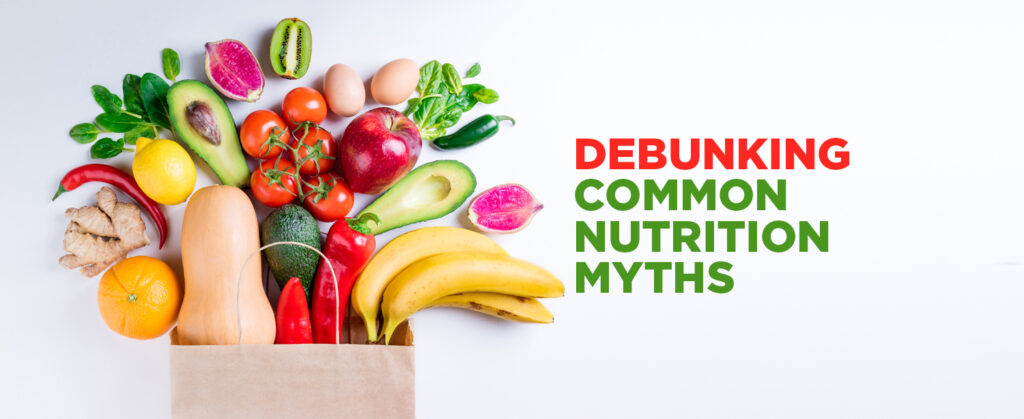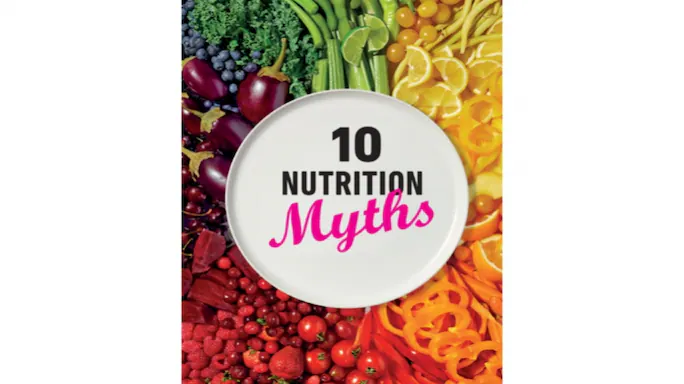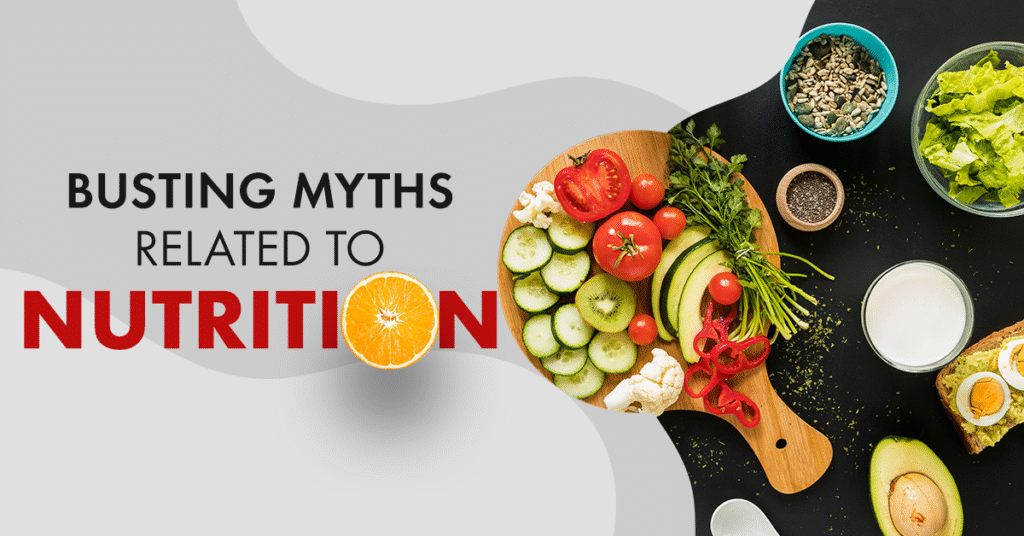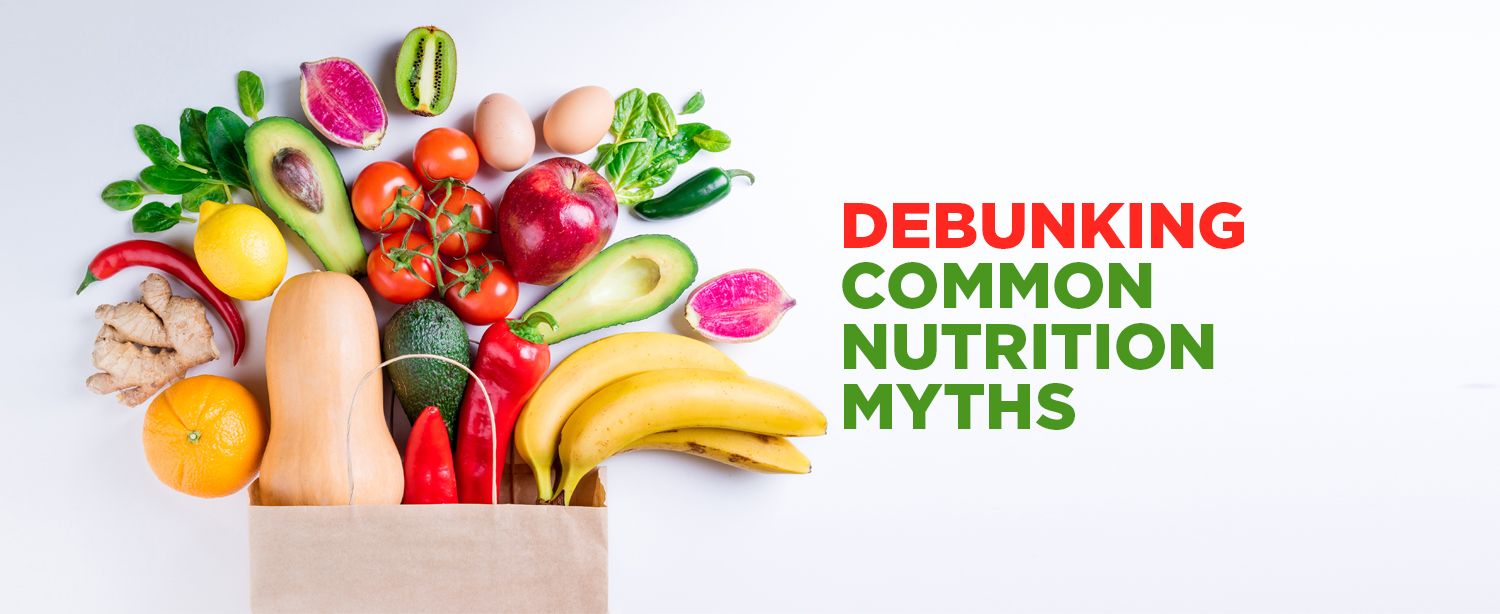In the age of information, nutrition advice is abundant—but not all of it is accurate. From social media influencers to well-meaning friends, nutrition myths are pervasive and can lead to confusion and poor dietary choices. In this article, we’ll debunk some of the most common nutrition myths and provide you with evidence-based information to guide your eating habits.
1. Myth: Carbs Are the Enemy
Fact: Carbohydrates are an essential macronutrient that provides energy for your body. The key is choosing the right types of carbs.
Why It’s a Myth: The demonization of carbohydrates often stems from low-carb diet trends. However, not all carbs are created equal. Whole grains, fruits, and vegetables are rich in fiber, vitamins, and minerals, making them a healthy choice.
Evidence: Studies have shown that diets high in fiber-rich carbohydrates can reduce the risk of chronic diseases such as heart disease and type 2 diabetes. (Mayo Clinic Health System)
2. Myth: Eating Fat Makes You Fat
Fact: Healthy fats are crucial for your body and can aid in weight management when consumed in moderation.
Why It’s a Myth: The low-fat craze of the 1980s and 1990s led to the misconception that all fats are harmful. In reality, unsaturated fats found in foods like avocados, nuts, and olive oil are beneficial for heart health.
Evidence: Research indicates that replacing saturated fats with unsaturated fats can lower the risk of cardiovascular disease. (NIDDK)

3. Myth: All Calories Are Equal
Fact: The source of your calories matters as much as the quantity.
Why It’s a Myth: While calorie intake is important for weight management, the nutritional quality of those calories is crucial for overall health.
Evidence: A study published in the American Journal of Clinical Nutrition found that diets rich in whole foods lead to better health outcomes compared to diets high in processed foods, even if calorie intake is the same. (Examine)
4. Myth: You Should Avoid Eating After 7 PM
Fact: The timing of your meals is less important than your overall daily calorie intake.
Why It’s a Myth: The idea that eating late at night leads to weight gain is not supported by scientific evidence.
Evidence: Research has shown that meal timing does not significantly affect weight loss, as long as total daily calorie intake and quality are maintained. (Gundersen Health System)
5. Myth: Gluten-Free Diets Are Healthier for Everyone
Fact: Gluten-free diets are necessary only for individuals with celiac disease or gluten sensitivity.
Why It’s a Myth: The popularity of gluten-free diets has led many to believe they are inherently healthier. However, gluten-free processed foods can be lower in fiber and higher in sugar and fat.
Evidence: A study in the Journal of Human Nutrition and Dietetics found that gluten-free diets often lack essential nutrients and may not offer health benefits for those without gluten-related disorders. (Mayo Clinic Health System)
6. Myth: Organic Foods Are Always More Nutritious
Fact: Organic foods can be part of a healthy diet, but they are not necessarily more nutritious than conventionally grown foods.
Why It’s a Myth: The perception that organic foods are significantly more nutritious is not supported by consistent scientific evidence.
Evidence: A review published in the Annals of Internal Medicine concluded that there is little difference in nutrient content between organic and conventional foods. (Scripps.org)
7. Myth: Detox Diets Are Necessary to Cleanse Your Body
Fact: Your body has its own detoxification systems—your liver and kidneys.
Why It’s a Myth: Detox diets often promise quick weight loss and improved health but lack scientific backing.
Evidence: According to the National Institute of Diabetes and Digestive and Kidney Diseases, there is no scientific evidence that detox diets are effective. (NIDDK)
8. Myth: You Can’t Get Enough Protein on a Plant-Based Diet
Fact: A well-planned plant-based diet can provide all the protein your body needs.
Why It’s a Myth: The belief that plant-based diets lack sufficient protein is a common misconception.
Evidence: According to the Academy of Nutrition and Dietetics, appropriately planned vegetarian and vegan diets are healthful and nutritionally adequate. (The Guardian)
9. Myth: Skipping Meals Helps with Weight Loss
Fact: Skipping meals can lead to overeating later and may disrupt your metabolism.
Why It’s a Myth: While it might seem logical to skip meals to reduce calorie intake, this can backfire.
Evidence: Studies have shown that skipping meals can lead to increased hunger and overeating later in the day, potentially leading to weight gain. (NIDDK)
10. Myth: Supplements Can Replace a Healthy Diet
Fact: Supplements can help fill nutritional gaps but should not replace a balanced diet.
Why It’s a Myth: The idea that supplements can replace whole foods is misleading.
Evidence: The National Institutes of Health states that “supplements cannot replicate the full range of health benefits that whole foods provide.” https://tastetrove.net/
Conclusion
Navigating the world of nutrition can be challenging with the abundance of information—and misinformation—available. By debunking these common myths, we hope to empower you to make informed decisions about your dietary choices. Remember, the best approach to nutrition is one that is balanced, varied, and tailored to your individual needs.
For more personalized nutrition advice, consider consulting with a registered dietitian or nutritionist who can provide guidance based on your specific health goals and dietary preferences.
Internal Links:
- Top 10 Nutrition Tips for a Healthier Lifestyle in 2025
- Healthy Eating Habits for Busy Professionals
External Links:
- Mayo Clinic: Nutrition and Healthy Eating
- National Institute of Diabetes and Digestive and Kidney Diseases: Myths About Nutrition and Physical Activity
If you need further customization or additional sections, feel free to ask!
FAQs About Nutrition Myths
1. Are low-carb diets always better for weight loss?
No. Weight loss depends on total calories, nutrient quality, and lifestyle. Balanced diets with complex carbs are often healthier long-term.
2. Can skipping meals help detox my body?
No. Your liver and kidneys naturally detox your body. Skipping meals can cause nutrient deficiencies and may lead to overeating later.
3. Are all fats unhealthy?
No. Healthy fats like those in avocados, nuts, seeds, and olive oil are essential for heart health, brain function, and hormone regulation.
4. Do I need supplements instead of food?
Supplements can fill gaps, but they cannot replace whole foods’ vitamins, minerals, and fiber. A balanced diet is always preferred.
5. Is gluten-free healthier for everyone?
No. Only people with celiac disease or gluten sensitivity benefit from gluten-free diets. For others, it doesn’t automatically improve health.
6. Can I rely on “superfoods” to prevent diseases?
Superfoods are nutrient-dense, but no single food can prevent illness. Overall dietary patterns matter more than individual foods.
7. Will eating after 7 PM make me gain weight?
No. Meal timing has minimal effect on weight. Total calorie intake and nutrient balance throughout the day are more important.
8. Can plant-based diets provide enough protein?
Yes. Properly planned plant-based diets with legumes, nuts, seeds, and whole grains can meet protein needs.
9. Are organic foods more nutritious than conventional ones?
Not necessarily. Organic foods may reduce pesticide exposure, but nutrient content is often similar to conventionally grown foods.
10. Can detox diets flush out toxins effectively?
No. Detox diets are largely unnecessary. Your body naturally eliminates toxins through the liver, kidneys, and digestive system.
✅ Recommended Products to Support Healthy Nutrition
Adding the right tools and products can make practicing good nutrition easier and more sustainable:
- NutriBullet Pro Plus Blender – Perfect for nutrient-packed smoothies and shakes.
- Meal Prep Bento Boxes (Reusable) – Helps portion meals and stay consistent with healthy eating.
- Brita Water Pitcher with Filter – Encourages proper hydration with clean, fresh water.
- Organic Superfood Powders (Spirulina, Matcha, Maca) – Easy way to boost nutrients in smoothies or snacks.
- Digital Food Scale – Ensures accurate portion sizes and helps track macronutrients.
- Kombucha Starter Kit – Supports gut health with probiotic-rich homemade drinks.
- Olive Oil Dispenser with Spray Nozzle – Helps control healthy fat intake while cooking.
- Fitbit Versa 4 or Apple Watch Series 10 – Monitors calories, activity, hydration, and sleep for better nutrition insights.
- Garden of Life Raw Organic Protein Powder – Plant-based protein to support muscle recovery and balanced nutrition.
- Stainless Steel Lunchbox – Durable, eco-friendly way to pack and transport healthy meals.

Other Related FAQs About Nutrition Myths
11. Are “low-fat” labeled foods always healthy?
No. Many low-fat products contain added sugar or artificial ingredients. Always check the ingredient list for hidden additives.
12. Do detox teas actually cleanse your body?
No. The liver and kidneys naturally detoxify your body. Detox teas may act as mild laxatives but do not remove toxins.
13. Is eating more protein always better for weight loss?
Not necessarily. Excess protein can strain the kidneys in some individuals, and total calorie balance is more important for weight management.
14. Can I rely on nutrition apps instead of a dietitian?
Nutrition apps are helpful for tracking, but they can’t replace personalized guidance from a registered dietitian.
15. Do “superfood” powders work like magic?
Superfood powders add nutrients but cannot replace a balanced diet. Whole foods provide fiber and phytochemicals that powders often lack.
16. Is natural sugar always safe?
Natural sugars (fruits, honey) are healthier than refined sugar, but overconsumption can still affect blood sugar and weight.
17. Can fasting improve overall health?
Intermittent fasting may have benefits for some, but it’s not suitable for everyone and doesn’t compensate for poor nutrition quality.
18. Are smoothies always a healthy choice?
Smoothies can be healthy if made from whole fruits, vegetables, and protein. Avoid adding excessive sugar or processed ingredients.
19. Do energy drinks boost nutrition?
No. Most energy drinks contain sugar and caffeine but little nutritional value. Focus on natural hydration and nutrient-dense foods.
20. Can I eat fast food and still be healthy?
Occasionally yes, but regular fast food is often high in unhealthy fats, sugar, and sodium. Balance with whole, nutrient-rich foods.
🔹 Top Products to Support Healthy Nutrition
Here’s a list of practical tools and products that align with busting nutrition myths and promoting a healthier lifestyle:

- NutriBullet Pro Plus Blender – For easy, nutrient-packed smoothies and shakes.The NutriBullet Pro Plus Blender is an essential tool for anyone looking to boost their nutrition effortlessly in 2025. With its powerful 1200-watt motor, it can quickly blend fruits, vegetables, nuts, and seeds into smooth, nutrient-rich smoothies and shakes. Perfect for busy mornings or post-workout recovery, this blender makes it easy to incorporate whole foods into your diet. Its compact design, durable blades, and easy-to-clean cups ensure convenience without sacrificing performance, making it a must-have for health-conscious individuals striving for a balanced lifestyle.
- Meal Prep Bento Boxes (Reusable) – Helps portion meals and reduce reliance on processed foods.Meal Prep Bento Boxes (Reusable) are a practical solution for anyone aiming to maintain healthy eating habits in 2025. These eco-friendly containers feature multiple compartments, allowing you to portion out proteins, vegetables, grains, and snacks for balanced meals throughout the week. By planning and prepping meals ahead of time, you can save money, reduce food waste, and avoid the temptation of unhealthy options. Durable, microwave-safe, and dishwasher-friendly, reusable bento boxes make nutritious eating convenient, organized, and perfect for work, school, or on-the-go lifestyles.
- Brita Water Pitcher with Filter – Ensures clean, fresh water for proper hydration.The Brita Water Pitcher with Filter is an essential tool for staying hydrated and supporting overall nutrition in 2025. By reducing chlorine, lead, and other common tap water impurities, it ensures clean, great-tasting water for drinking, cooking, and making smoothies. Its sleek, space-saving design fits easily in most refrigerators, making it convenient for daily use. With long-lasting, replaceable filters, the Brita pitcher is an eco-friendly choice that helps reduce single-use plastic bottles while encouraging consistent hydration—a key component of a healthy lifestyle.
- Organic Superfood Powders (Spirulina, Matcha, Maca) – Convenient way to add antioxidants and protein.Organic Superfood Powders like Spirulina, Matcha, and Maca are powerful nutrition boosters that can easily be incorporated into your diet in 2025. Spirulina is packed with protein, vitamins, and antioxidants to support energy and immune health. Matcha provides a gentle caffeine boost along with potent antioxidants to enhance focus and metabolism. Maca root powder is valued for hormone balance, stamina, and overall vitality. These powders can be blended into smoothies, oatmeal, or baked goods, offering a convenient way to increase nutrient intake and support a balanced, healthy lifestyle.
- Digital Food Scale – Accurate portion control to avoid overeating.A Digital Food Scale is an essential tool for anyone looking to maintain portion control and track nutrition accurately in 2025. By precisely measuring ingredients, it helps you monitor calorie intake, macronutrients, and serving sizes, making meal planning more effective. Ideal for meal prep, baking, or following specific dietary plans, a digital food scale eliminates guesswork and supports consistent, balanced eating. Lightweight, easy to clean, and often equipped with features like tare functions and unit conversions, it’s a practical addition to any kitchen focused on healthier nutrition.
- Kombucha Starter Kit – Homemade probiotics for gut health.A Kombucha Starter Kit is a convenient way to brew your own probiotic-rich kombucha at home, supporting gut health and overall wellness in 2025. These kits typically include a SCOBY (symbiotic culture of bacteria and yeast), starter tea, and step-by-step instructions, making it easy for beginners to get started. Homemade kombucha allows you to customize flavors and control sugar content, ensuring a healthier alternative to store-bought versions. Packed with probiotics, antioxidants, and beneficial acids, it promotes digestion, boosts immunity, and adds a refreshing, tangy beverage option to your daily nutrition routine.
- Olive Oil Dispenser with Spray Nozzle – The Olive Oil Dispenser with Spray Nozzle is a practical tool for cooking healthier meals in 2025. Its spray mechanism allows you to evenly coat pans, salads, or roasted vegetables with just the right amount of oil, helping to reduce excess calories while retaining flavor. Made from durable, BPA-free materials, this dispenser is easy to use, clean, and refill. Perfect for home cooks who want to control fat intake without sacrificing taste, it supports balanced nutrition and makes preparing wholesome meals simple and efficient.
- Fitbit Versa 4 or Apple Watch Series 10 – Tracks calories, activity, hydration, and sleep patterns.The Fitbit Versa 4 and Apple Watch Series 10 are powerful wearable devices that help you monitor and improve your nutrition, fitness, and overall health in 2025. Both devices track calories burned, steps, heart rate, sleep patterns, and hydration, giving you real-time insights into your daily habits. With apps for meal logging, activity tracking, and personalized reminders, these smartwatches make it easier to stay on top of your nutrition goals. Sleek, durable, and user-friendly, they are perfect companions for anyone striving for a balanced lifestyle and smarter dietary choices.
- Garden of Life Raw Organic Protein Powder – High-quality plant-based protein for muscle support.The Garden of Life Raw Organic Protein Powder is a premium plant-based protein supplement that supports muscle growth, recovery, and overall nutrition in 2025. Made from a blend of organic peas, sprouts, and seeds, it provides a complete amino acid profile while remaining free from artificial additives and sweeteners. Fortified with probiotics and digestive enzymes, this protein powder also promotes gut health and nutrient absorption. Easy to mix into smoothies, oatmeal, or baked goods, it’s a convenient and clean way to boost protein intake and maintain a balanced, healthy diet.
- Stainless Steel Lunchbox – Portable, eco-friendly way to bring balanced meals on the go.The Stainless Steel Lunchbox is a durable, eco-friendly solution for packing healthy meals on the go in 2025. Made from high-quality, BPA-free stainless steel, it keeps food fresh without absorbing odors or stains, unlike plastic containers. Its sturdy design and secure lids make it ideal for portioning balanced meals, whether for work, school, or travel. Reusable, easy to clean, and built to last, this lunchbox supports mindful eating, reduces single-use packaging waste, and makes maintaining a nutritious diet both practical and convenient.
- Spiralizer – Turns vegetables into noodles for low-carb, nutritious meals.The Spiralizer is a versatile kitchen tool that makes healthy eating fun and creative in 2025. It allows you to turn vegetables like zucchini, carrots, and sweet potatoes into noodle-like shapes, offering a low-carb, nutrient-rich alternative to traditional pasta. Perfect for meal prep, salads, and stir-fries, the spiralizer helps increase vegetable intake while keeping meals visually appealing and satisfying. Durable, easy to use, and simple to clean, it’s an excellent addition to any kitchen for those looking to boost their nutrition without compromising on taste or variety.
- Meal Planning Notebook or App – Helps plan balanced meals and avoid processed options.A Meal Planning Notebook or App is an invaluable tool for anyone aiming to maintain a balanced and organized diet in 2025. By planning meals in advance, you can ensure proper portion sizes, variety, and nutrient balance throughout the week, reducing reliance on processed or unhealthy foods. Digital apps offer features like grocery lists, calorie tracking, and recipe storage, while notebooks provide a tangible way to track meals and monitor progress. Both options help streamline meal prep, save time, and support consistent healthy eating habits, making nutrition management simple and effective.
- Reusable Snack Bags – Perfect for portioned nuts, seeds, or dried fruits as healthy snacks.Reusable Snack Bags are a practical and eco-friendly way to store healthy snacks in 2025. Made from durable, BPA-free materials, they are perfect for portioning nuts, seeds, dried fruits, or veggie sticks for on-the-go nutrition. By using reusable bags, you reduce single-use plastic waste while keeping snacks fresh and organized for work, school, or travel. Lightweight, easy to clean, and convenient, these snack bags make it simple to maintain healthy eating habits throughout the day without compromising sustainability.
- Air Fryer – Reduces oil use while making crispy, nutritious meals.
- Smart Water Bottle (Hydration Tracker) – Encourages daily water intake to support metabolism and overall health.A Smart Water Bottle with Hydration Tracker is an innovative tool for maintaining optimal hydration and supporting overall health in 2025. These bottles track your daily water intake, send reminders to drink, and sync with apps or smartwatches to help you meet hydration goals. Proper hydration aids digestion, metabolism, energy levels, and skin health, making this bottle a valuable companion for a balanced lifestyle. Durable, portable, and easy to clean, a smart water bottle encourages consistent water consumption, helping you stay refreshed and energized throughout the day.
